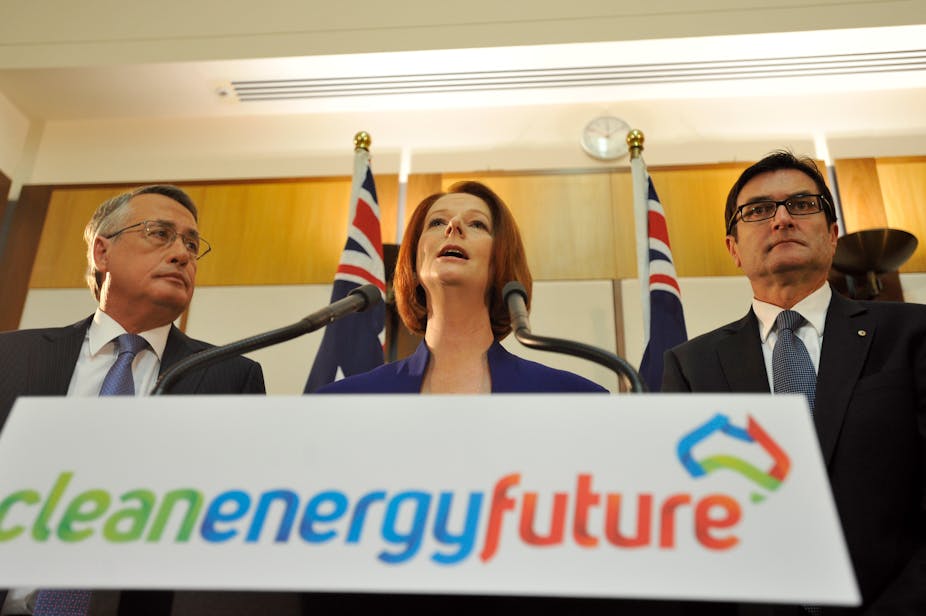It began with the familiar sight of the Prime Minister standing behind a lectern, flanked by Australian flags. But unlike previous press conferences, she was joined by Treasurer Wayne Swan and Climate Change Minister Greg Combet.
Under the collective gaze of the nation, Ms Gillard began the speech that would be the start of either a springboard to magnificent political success or a long death-march to the next election.
Ms Gillard began her speech by outlining why she was leading a government that sought to implement a carbon tax. Looking as calm and controlled as she often has as prime minister, Ms Gillard argued that Australia needed to “seize a clean energy future”. In a nod to the failed Rudd ETS scheme, Gillard accepted that there were “mis-steps” in the past to implement similar policies.
The prime minister’s speech wasn’t simply to announce the new tax. Rather, it was also designed to lay the groundwork for the coming “battle of ideas” between her government and Tony Abbott’s opposition. Already, both leaders have threatened to wear out their leather shoes as they criss-cross the country trying to sell their policies.
In outlining her government’s plans, Ms Gillard sought to position the carbon tax as something that was supported by all sides of politics. She noted that former Conservative British Prime Minister Margaret Thatcher, as well as Australia’s John Howard, had acknowledged the need for a form of controlling emissions.
This could also be seen as a veiled attempt at positioning Mr Abbott as a man without a realistic plan. The implication here was that if two long serving conservative prime ministers believed in this plan, how can Abbott reject it?
If the political arguments were questionable the science was not, according to Gillard. Indeed, the prime minister stated that there was an “avalanche of science” that showed that humans contributed to global warming.
But, according to opinion polls, Gillard has faced an avalanche of opposition from the public after announcing the government would pursue a carbon tax. This was after she had proclaimed that the tax was off the agenda during the election campaign. So this speech was an opportunity for Gillard to try to reconnect with those who had stopped listening to her.
She did this in a few ways. First, Gillard acknowledged that many Australians were concerned about the impact to their family budget. She clearly took pleasure in announcing a raft of concessions and handouts that would seek to ameliorate the impost of a carbon tax.
The prime minister also sought to tie in the policy with “Labor values” and “Labor traditions”, phrases repeated by Ministers Swan and Combet. Gillard argued that the carbon tax was akin to Labor’s past policy “triumphs” of floating the dollar and reducing tariffs.
In doing so, Gillard was effectively asking Australians to have faith in her government that it was doing “the right thing” for Australia’s future. In times of such cynicism, however, testing the people’s faith may be fraught with political risk.
While the speech was punctuated by environmental concerns, taxation reform seemed to be of equal importance. Here, Wayne Swan’s time at the lectern gave insight into how the tax system would be affected.
The raising of the tax-free threshold to $18,200 was evidently something the Treasurer enjoyed announcing. Some lines in Swan’s speech appeared to test potential campaign slogans, however. For example, Australia “can’t power ahead without clean energy” may feature in future advertisements.
As Climate Change Minister, Greg Combet also presented well and provided much of the detail as to how the tax would impact on industry.
The presence of the two ministers could also be seen to be a bit of a tactical decision. It provided a sense of unity. Rather than the carbon tax being seen as a Gillard initiative, the other minister’s presence showed it to be an initiative of the government.
After months of speculation, and attacks by opponents, the Gillard Government has finally got some details to defend its position. To make this task easier, the government is expected to roll out advertising campaigns to spruik the policy.
With such a big and controversial policy to debate, the real battle has just begun. The speech has started the race and both leaders, and their backbenchers, will hit the ground running. Leather shoemakers should be wringing their hands in anticipation.

